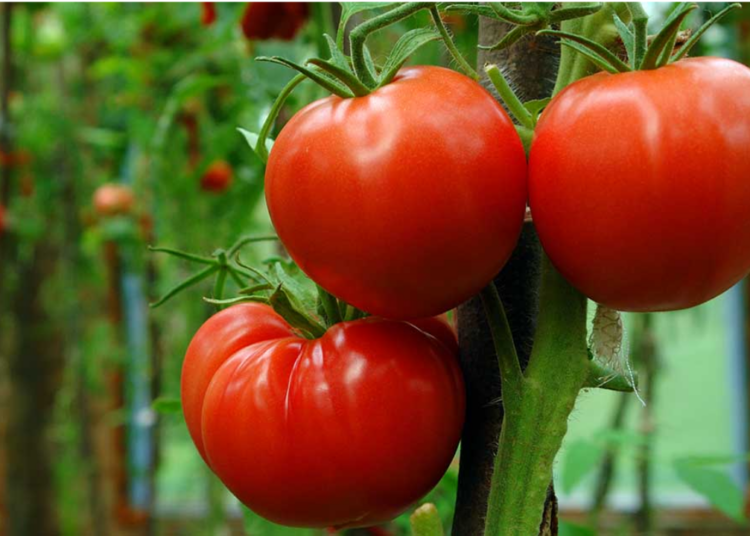The current rising prices of tomato across the country, following the outbreak of the moth family specie, Tuta Absoluta, popularly known as Tomato Ebola, have led to outcries from farmers and consumers on the need to initiate efforts aimed at combating the devastation and saving farmers of further losses.
Nigeria needs 5.4 million metric tonnes of tomato, but has an annual deficit of 1.3 million metric tonnes. With the current pest infestations ravaging tomato farms, there are fears that this deficit level may rise to 3 million metric tonnes. The consequence is best imagined in terms of escalation of tomato prices and burden to be borne by farmers and consumers.
So frightening is the exposure by the National Secretary of the National Tomato Growers, Processors and Marketers Association of Nigeria (NATPAN), Mallam Sani Danladi, when he grieved over the destruction of 90 percent of tomato produced in Kano State by the invading pests. Apart from obliterating investments by 500 tomato farmers in Kano State, the pest attacks have thrown a pall of discouragement and crippling uncertainty in tomato farming.
On Tuesday, Horti Nigeria, supported by the Dutch Government, collaborated with the Nigeria AgriBusiness Group (NABG), Federal Ministry of Agriculture and Rural Development (FMARD) and the Ibadan-based National Horticultural Research Institute (NIHORT), among other organisations, hosted a media interaction session in Abuja to sound the alarm bell on the deadly scourge caused by pest attacks on tomatoes that was first noticed in 2015.
Considering the hardship faced by tomato farmers, there is no doubt that challenging times lie ahead for both producers and consumers of the product. With the scarcity of tomatoes beginning to be noticeable, prices of the produce are hitting the roof, and making it impossible for the average Nigerians to afford the produce.
The current sensitisation efforts by Horti Nigeria, in collaboration with NABG, NIHORT and NATPAN, among others, remain a dividing line in the battle to create awareness and combat further losses incurred as a result of the pest outbreaks in Katsina, Kaduna, Kano and Gombe. To stave off further attacks by Tuta Absoluta, the President of the NABG, Mr. Emmanuel Ijewere, insists that tomato farmers should not be left alone as he called for an urgent declaration of ‘war’ on the insect invasions that have wrecked monumental destruction on the fortunes of farmers.
Tomato producers, Ijewere adds, should not be left alone as he assured distraught tomato farmers that the NABG is currently engaged in organising stakeholders’ meetings to synergise on addressing challenges posed by Tuta Absoluta on farmers who are the major sufferers.
“Tuta Absoluta is an insect that has ravaged tomato farms and from what we have discovered, the insect is very devastating to tomatoes. These insects have decided to build their homes under the leaves and when the insecticide is sprayed it doesn’t affect them. The affected states are mainly Kano, Kaduna, Katsina and Gombe, but the insects don’t need a visa to go to any other states as long as the conditions are right. Climate change has enhanced the movement of pests around the field; the warm environment helps them to spread wide, increased humidity allows these pests to thrive, hence, the new outbreak of Tuta Absoluta”.
Describing tomato farmers as the biggest sufferers in these deadly pest attacks, he says the farmers risk losing their investments in inputs and not harvesting anything at the end of the day. The NABG President is optimistic that efforts are almost completed in ensuring an effective collaboration in tackling this scourge sometimes referred to as Tomato Ebola.
The Director of Horticulture, Federal Ministry of Agriculture and Rural Development (FMARD), Dr. Deola Lordbanjou, traces the current pest attacks to Galama Local Government Area of Kano State, where about 300 hectares were destroyed by the Tuta Absoluta infestation. He says the FMARD is working in collaboration with NAPTAN to monitor what is happening in other states.
“We have our records already and we are working on two things; the Ministry is convening a stakeholders’ meeting, which may be merged with what NABG is planning. The Ministry is sourcing for funds seriously and interventions to solve critical problems of Tuta Absoluta and we are making some money available to NIHORT to produce the hybrid seeds they just developed and to procure some Integrated Pest Management (IPM) measures to control Tuta Absoluta,” Lordbanjou disclosed.
The fear entertained by farmers involved in tomato production has become real, following the level of destruction unleashed by the invading vermin. The role of research agencies like NIHORT is emblematic of the resolve in deploying knowledge to tackle the pestilence caused by the pests. NIHORT’s Executive Director/Chief Executive Officer, Dr Mohammad Attanda, recalls how pest attacks caused monumental destruction of tomato in 2015. Represented by the Institute’s Head of Bio-pesticide Centre, Oladigbolu Abiola, the NIHORT’s boss says: “The sole dependence on synthetic insecticides for the control of Tuta has resulted in development of resistance – a change in the sensitivity of Tuta population to synthetic pesticides, resulting in the failure of a correct application of the pesticides to control Tuta as is being experienced now, hence aggravating outbreaks whilst the food security of the nation is threatened.”
Getting to the roots of combating the pest invasion must go beyond pesticides and other measures. The need for early detection of the pest attack and deploying relevant measures to avoid attacks by the pests is imperative. Apart from using recently released tomato seeds bred for high yields, good shelf life and nutritional qualities, tomato farmers must embrace sustainable Tuta Integrated Management measures that include bio-pesticide, named NIHORT LYPTOL and NIHORT RAKTIN, which effectively kills the egg and damages the larvae of Tuta and TUTA TRAP TRAY which kills adult Tuta.
The Director General of NABG, Dr Manzo Maigari, recalls that Tuta Absoluta attacks peaked in 2016 and 2017, leading to devastations of tomato farms, thereby causing losses and forcing the NABG to seek collaboration in proffering solution to the pest menace that wreaked havoc on the fortunes of tomato producers.
According to him: “Today Tuta Absoluta is back and we have to call on these major stakeholders to come together to forge the way forward. We have also seen the entrance of a new stakeholder, Horti Nigeria, funded by the Dutch Government, and they also have a regime of practices that has proven beneficial to farmers because in the clusters that are managed by them, so far there is resistance by the Tuta Absoluta. Therefore, this adds to the bouquet of solutions we want to present an integrated approach to farmers in tackling the challenge,” Maigari enthuses.
The Horti Nigeria Project Director, Mohammed Salasi Idris, laments that in the past, the destruction of Tuta Absoluta was possible due to the lack of awareness by most farmers on how to combat the pest attack. He is positive that this time around, critical stakeholders, including farmers and relevant partners, are prepared to embark on a sensitisation programme to help farmers deal with the problem caused by the outbreak of the pests.
Assuring farmers and relevant stakeholders that the program’s demonstration fields were not affected despite the pest attack on neighbouring farms, Idris declares that Horti Nigeria and other partners are “willing to work in unison with farmers and other agro-input dealers to make available techniques and technologies needed to combat these small but disastrous pests”.
From the submissions proffered by experts, there’s no denying the fact that the days of Tuta Absoluta are set to be numbered as stakeholders renewed their commitments to overcome these pest attacks that have thrown tomato farmers into the valley of despair and, at the same time, increase the deficit levels in Nigeria’s tomato requirement needs for citizens.





